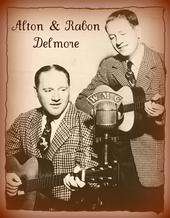The Delmore Brothers
| The Delmore Brothers | |
|---|---|
 | |
| Background information | |
| Origin | Elkmont, Alabama, United States |
| Genres | Country |
| Years active | 1926–1952 |
| Labels | Columbia, Bluebird, Decca, King |
| Associated acts | The Sacred Aires Quartet |
Alton Delmore (December 25, 1908 – June 8, 1964) and Rabon Delmore (December 3, 1916 – December 4, 1952), billed as The Delmore Brothers, were country music pioneers and stars of the Grand Ole Opry in the 1930s.[1] The Delmore Brothers, together with other brother duos such as the Louvin Brothers, the Blue Sky Boys, the Monroe Brothers (Birch, Charlie and Bill Monroe), the McGee Brothers, and The Stanley Brothers, had a profound impact on the history of country music and American popular music.
Biography
The brothers were born into poverty in Elkmont, Alabama, as the sons of tenant farmers amid a rich tradition of gospel music and Appalachian folk.[2] Their mother, Mollie Delmore, wrote and sang gospel songs for their church. The Delmores blended gospel-style harmonies with the quicker guitar work of traditional folk music and the blues to help create the still-emerging genre of country. In addition to the regular six-string acoustic guitar, the duo was one of the few to use the rare tenor guitar, a four-string instrument that had primarily been used previously in vaudeville shows.[3]
In 1925, 16-year-old Alton wrote his first song ("Bound for the Shore"), which he co-wrote with his mother. It was published by Athens Music Co.[3]
The Brothers did their first recording session for Columbia in 1931, recording "I've Got the Kansas City Blues" and "Alabama Lullaby," which became their theme song.[4] They signed a contract with Victor's budget label Bluebird in 1933 and became regulars on the Grand Ole Opry. Within three years, they had become the most popular act on the show.[5] Disagreements with Opry management led to the brothers leaving the show in 1939. While they continued to play and record music throughout the 1940s, they never achieved the same level of success they had with the Grand Ole Opry.[5]
In 1941, their song "When It's Time for the Whippoorwill to Sing" made the Billboard "Hillbilly" top three.
Their "Freight Train Boogie" (recorded for the King label in 1946) is regarded by some as the first rock and roll record. Their best-known song, "Blues Stay Away From Me" (also on King, 1949), was covered by Johnny Burnette and The Rock and Roll Trio, Gene Vincent and the Blue Caps, The Louvin Brothers, The Browns, Les Paul and Mary Ford, Doc Watson, The Notting Hillbillies and The Everly Brothers.
Over the course of their careers, the Delmores wrote more than one thousand songs. Some of the most popular were "Brown's Ferry Blues," "Gonna Lay Down My Old Guitar" and "Fifteen Miles from Birmingham."[5]
Rabon died of lung cancer in 1952, a day after his 36th birthday.[5] Following Rabon's death, Alton suffered a heart attack, the loss of his father and his daughter Susan, all within a three-year period. He moved back to Huntsville, Alabama. He taught some guitar, did odd jobs, and devoted his creative energies to writing prose. He wrote a series of short stories and his autobiography, Truth is Stranger than Publicity, published posthumously in 1977 by the Country Music Foundation.[3]
Legacy
The Delmore Brothers were inducted into the Alabama Music Hall of Fame in 1989 and the Country Music Hall of Fame in 2001. Their pioneering contribution to the genre has been recognized by the Rockabilly Hall of Fame.[4]
Bob Dylan was quoted in the Chicago Tribune, on November 10, 1985 as saying "The Delmore Brothers, God, I really loved them! I think they've influenced every harmony I've ever tried to sing."[6]
Partial discography
- 1957: Sacred Songs (King Records)
- 1964: In Memory (King)
- 1964: In Memory, Vol. 2 (King)
- 1966: Wonderful Sacred Songs (King)
- 1984: When They Let the Hammer Fall (Bear Family)
- 2003: Classic Cuts: 1933-1941 (JSP)
- 2005: Fifty Miles to Travel (Ace)
- 2007: The Delmore Brothers, Vol. 2: The Later Years 1933-1952 (JSP)
- 2008: Blues Stay Away from Me (Jasmine)
- 2008: Classic Cuts, Vol. 3: More from the 1930s Plus (JSP)
Awards
- Citation of Achievement from Broadcast Music Inc. presented to Alton Delmore for "Beautiful Brown Eyes", 1951.
- Induction into the Nashville Songwriters Hall of Fame, 1971
- Induction into the Alabama Country Music Hall of Fame, 1987
- Induction into the Alabama Music Hall of Fame, 1989
- Independent Country Music Association-Germany, Induction into the Hall of Fame. 2000
- Independent Country Music Association-Germany, Artists of the 20th Century, 2000
- Inducted into the Country Music Hall of Fame, October 4, 2001
- National Academy of Recording Arts & Sciences "Blues Stay Away From Me", Delmore Brothers, King, 1949, was inducted into the Grammy Hall of Fame, January 2007
- Limestone County Fiddlers Convention, c. 1920s, First Prize, duo awarded one sack of flour and a new pair of socks. <Alton Delmore, 1959>
References
- ↑ "Opry Timeline - 1930s". Opry.com. Retrieved July 10, 2012.
- ↑ Archived December 5, 2006, at the Wayback Machine.
- 1 2 3 "The Delmore Brothers - A History". Nativeground.com. Retrieved 2012-12-09.
- 1 2 "Nashville Songwriters Foundation". Nashville Songwriters Foundation. Retrieved 2012-12-09.
- 1 2 3 4 Archived July 23, 2007, at the Wayback Machine.
- ↑ "Delmore Brothers Scrapbook". Delmorebrothers.net. 2011-08-16. Retrieved 2012-12-09.
External links
- Delmore Brothers website maintained by Alton's daughter
- Sessionography, Discography, Biography and all about them by Alain Nicolas
- Native Ground
- Nashville Songwriters Hall of Fame
- Alabama Hall of Fame
- Rockabilly Hall of Fame
- Country Music Hall of Fame and Museum
- Delmore Brothers, biography and influences at C.F. Martin & Co. 180 Years of American Music History.